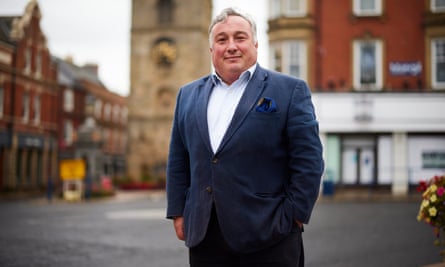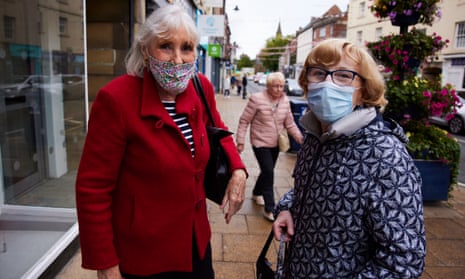It is perhaps most famous for being the birthplace of the suffragette Emily Wilding Davison. But now Morpeth, nestled in the southern tip of Northumberland, can also claim to be leading the way on Covid vaccines.
More than 90% of adults in the market town have received maximum protection against the virus – the highest of anywhere its size in England – while Northumberland has the highest proportion of fully vaccinated residents in the country.
It means vulnerable people in Morpeth will be among the first in line when the NHS begins rolling out booster jabs next week, in a move announced by the health secretary, Sajid Javid, on Tuesday.
David Bawn, the Conservative mayor of Morpeth town council, said he was certain the boosters would be taken up as eagerly.
“We’re very sensible here,” he said on a bustling day of trade near the town’s medieval clock tower. “We do weigh things up but we do realise how important it is to get on with normality.”

However, Bawn said it was “worrying” that only 3% of adults across Africa had been fully vaccinated and that the UK should do more to help other countries catch up.
“These things [the booster programme and supporting other countries] can run in tandem. It’s in our interests to assist other countries who are behind the curve and I would support the government in donating to the international scheme. We have the resources to live up to and exceed our international obligations,” said Bawn, who is also a Northumberland county councillor.
“It’s one thing to be able to go to your local coffee shop again but for businesses to trade across borders – that’s what true opening up is.”
The UK is the second biggest pledger of vaccines behind the US, promising to donate 80m doses to the international sharing scheme Covax. However, to date the UK has reportedly only delivered 5m of these, just 6.4%.
The World Health Organization has said almost all of Africa’s 54 nations are set to miss the “urgent global goal” of vaccinating the most vulnerable 10% of the population by the end of September.
Sporting a flowery face mask as she toured Morpeth’s charity shops, Ann Turnbull agreed more could be done to help other countries. Giving her age only as “way over 80”, Turnbull said the UK should immediately offer more doses to Africa rather than waiting until the end of the booster programme.
“I think we should be doing it now. It’s a case of not shutting the stable door if you do it too late,” she said.
Tony Snaith, 61, said vaccinating people in other countries would help the UK by potentially eradicating new variants, which could otherwise make their way to this country.
“Perhaps we should be doing more,” he said. “They need to catch up because it’s a global pandemic, isn’t it – it’s not just here.”
One business owner, who did not want to be named, said it was “not really humane” for wealthy nations to buy up a huge share of the vaccine supply at the expense of poorer countries.
“It’s terribly sad. I think we’re very fortunate to be able to have as much vaccine as we do and I get really frustrated when I hear that a lot of it is going out of date. That could have been shared abroad,” she said, questioning why wealthy nations had not come up with a more ambitious package to share vaccines at the G7 event in Cornwall this summer.

Christine Greaves, 65, agreed there should be an “international summit” to sort out vaccination around the world but was also “very, very happy” to be having a booster jab. Greaves lives in Blackpool, which currently has England’s highest coronavirus rates, and whose health conditions mean she lives with chronic pain and has spent most of the pandemic shielding.
“I was sat there crying my eyes out, saying I didn’t want to die,” she said, describing watching news coverage of the Delta variant. “So I’d welcome another jab, definitely.”
Lisa Robins, the manager of Pennystone Court care home in Blackpool, whose staff and residents will be in the first cohort for booster jabs, said she welcomed the rollout with open arms. The “consistently high” infection rate in the Lancashire town contributes towards a sense of “moral duty” to do everything possible “to protect our residents and our families”, including top-up jabs, she said.
